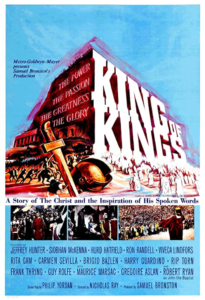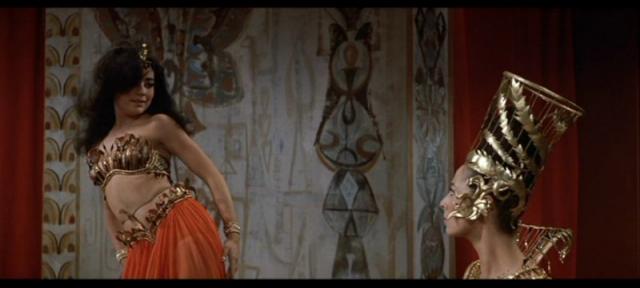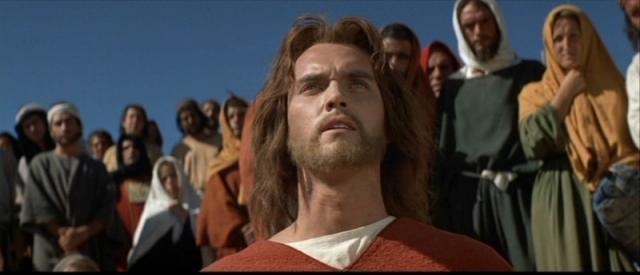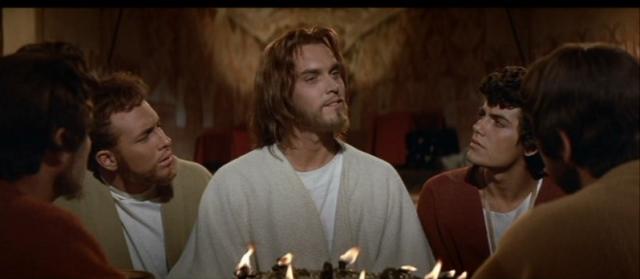King of Kings (1961)
“For I say unto you, love your enemies; bless them who curse you; and pray for those who despise and persecute you! For if you love only those who love you, what reward shall you have?”
|
Synopsis: |
|
Genres, Themes, Actors, and Directors:
Review: Ray and Yordan are at their best when humanizing iconic biblical events, such as the justly praised Sermon on the Mount sequence, and their intimate recreation of the Last Supper; less interesting are the massive battle scenes, which perhaps are expected fare in an epic drama but distract from the very real human story being told. Some have argued that too much time is spent showing the Romans’ reactions to Jesus’s growing popularity, but the actors in the key Roman roles — including Viveca Lindfors, Frank Thring, and Hurd Hatfield — are all enjoyable to watch, and their decadent lifestyle ultimately provides a nice contrast with that of the hard-working Jews. My favorite “Roman scene” shows the infamous Salome (played by Brigid Bazlen as a sexy teenage hussy) tempting her stepfather, King Harrod (Thring), into decapitating John the Baptist (a shaggy-headed Robert Ryan) and bringing her his head on a platter; while this vignette may not be substantiated by biblical scholars, it plays well on the screen! Ultimately, King of Kings will be of most interest either to Christians (who likely will be pleasantly surprised by how events are depicted) or fans of mid-century historical epics; for all-purpose film fanatics, it’s worth a look simply for its historical notoriety. Note: In 1980, Hunter was (perhaps unfairly) nominated by the Medved brothers as one of the worst actors to play Jesus Christ in a film — though he lost out on winning the Golden Turkey Award in this category to Ted Neeley in Jesus Christ Superstar. Redeeming Qualities and Moments:
Must See? Categories
Links: |




One thought on “King of Kings (1961)”
Must-see – and holds up well to multiple viewings.
Just as I approach Christmas tales with trepidation, I tend to approach films of the Christ story in the same way (although there are fewer of the latter). A number of Christ stories aren’t directly about Christ at all – Christ is either on the periphery or unseen. In at least one instance, the approach is taken with so much somber reverence – ‘The Greatest Story Ever Told’ – that the audience has no refuge but sleep.
For me, no film better details the story than Nick Ray’s ‘King of Kings’. I probably watch it once a year – not necessarily at Christmas. (‘Purists’ would probably consider this more an Easter film. I can see why, of course – but…oh, well.) Ray was the perfect choice to direct; who better than a maverick outsider to relate the major chapters of the life of the ultimate outsider?
This was a large undertaking – with quite a few sets and locales, battle scenes and thousands of extras – and yet the result feels like simplicity itself. It’s about 3 hours long and, each time I see it, the time seems to fly and the film is over before I know it. I always find the film compelling. (So it was a particular treat to see it for the first time in Blu-ray, as if seeing it fresh.)
As opposed to ‘The Ten Commandments’, ‘King…’ has only a few genuine stars; the large speaking cast is mostly comprised of very strong character actors (a wise decision since there is almost no distraction of ‘star power’ and we can more clearly see these actors as characters). Each and every actor is perfectly cast and I could go through them one by one with praise. But it is true ensemble work, with each contributing to Ray’s overall vision.
Of the stars, though, Ryan is noteworthy as John the Baptist. Here is a performance unlike anything he has done elsewhere – while typically bold and forceful, it is also singularly sensitive. Among the supporting players, I’m always drawn to Lindfors and Hatfield, Siobhan McKenna (beautifully understated as Mary), as well as Ron Randell as Lucius and Carmen Sevilla, the latter memorably moving as Mary Magdalene. (“Psychopathic” is a proper word for Bazlen’s performance as Salome – the close-up shot of her as she makes her sick request suggests, for a moment, that we’re in a horror film.)
The idea that Hunter would be nominated as the worst actor to play Christ simply baffles me. True, Hunter was perhaps not known for commanding performances in film overall – but, under Ray’s direction, he delivers what is perhaps the best performance of his career. There is such control in what he does. I especially like him when he prays in Gethsemane and we finally see him torn between his two natures: spirit and man. Hunter’s shining moment, though, is also the centerpiece of the film: the Sermon on the Mount. What a magnificent sequence! – and is probably among my favorite sequences in film history.
Yordan’s script is nothing short of miraculous (one just can’t get around the word). There is not a wasted scene, nor is there one you would want left out. It’s also surprising how, since the time it was made, the dialogue still feels rather modern – it sounds exactly the way people talk. The added plus is that Ray apparently instructed his actors to not feel a need to rush things – consequently, in many scenes, we can tell that the characters not only pause to absorb what they’ve heard but think before they respond.
It took three DPs to shoot this film – and one can see why; its scope is gigantic. No doubt, though, that the film’s most powerful moments come with the Crucifixion, and particularly the way that section is photographed, building to an eerie crescendo.
The majesty of the film is, of course, firmly established by Rozsa’s remarkable score, which feels reverent without feeling like overkill.
Obviously, I’m at a loss to find anything but good things to say about what I think is one of Ray’s masterpieces. Underrated in its day, I hear that, over time, it has been embraced for the fine film it is. I tend to get teary-eyed a number of times when watching ‘King of Kings’ – not because it’s sad, necessarily, but because I find so much of it moving and…well, yes, inspirational.